EF Education-EasyPost CEO Jonathan Vaughters has expressed frustration with the UCI’s treatment of teams at the Tour de Romandie Féminin and also in the sport in general, saying that he believes the governing body is not acting correctly in how it is interacting with riders and squads.
On Friday five teams were blocked from starting in Romandie, with Canyon-SRAM Zondacrypto, Lidl –Trek, Team Picnic PostNL, Team Visma Lease a Bike and EF Education – Oatly all told they could not line out.
A UCI statement said that those teams “refused to comply with the rules for the race related to the implementation of GPS trackers as a test for a new safety system.”
One rider per team was to use a tracking device during the race, with the UCI requiring each of the squads to nominate the competitor concerned.
Also read: UCI Disqualifies 5 Big Teams from Tour de Romandie Féminin in GPS Tracker Dispute
The five excluded teams declined to do so; Vaughters explained the context to Velo, expressed surprise at the outcome, and elaborated on a much wider level of frustration he said the teams have with the UCI.
“This is a bit of a case of ‘hey guys, can you ask us first about what might be a good place to start before just imposing this upon us?,’” he told Velo in a long call on Friday. “‘And could you allow us to have a little bit more of a voice in what are the real core problems with safety in the sport?’”
“So then it comes down to this. We didn’t actually refuse. We didn’t refuse these devices. To be really clear, not one of these teams refused the devices.
“What we said is, is, ‘this is your idea. This is not our idea. This is your mandate. This is not our collaborative effort. So if you want to do the devices, you got to choose which rider you’re going to put it on, and you got to tell us, and you got to put it on the bike.’”
‘It’s a line in the sand’
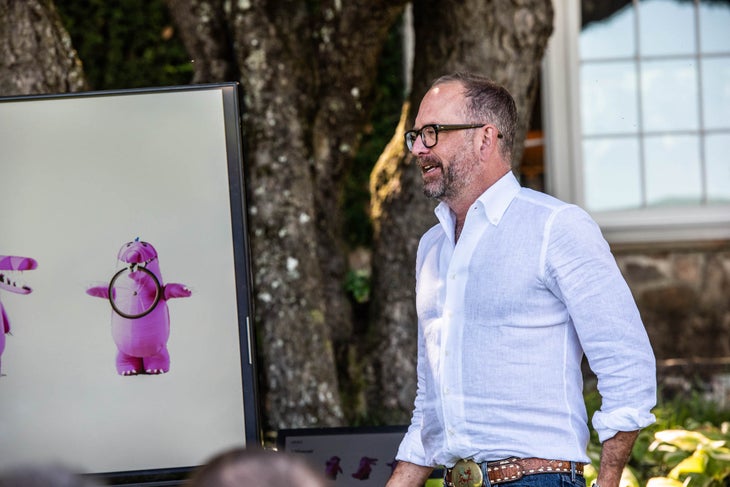
GPS trackers became a major topic in the sport at last year’s world road race championships. The young Swiss rider Muriel Furrer crashed in the junior women’s road race, went off the road and lay undiscovered for more than an hour in a woodland. She tragically died from her injuries.
The UCI stated on Friday that the introduction of trackers was intended to boost safety in the sport. Vaughters gets that, but said that the way things were carried out in Romandie was disrespectful.
On the surface, it may not seem like a massive issue. Some will wonder how difficult it would be for teams to just pick a rider to use the tracker, and to use the device in a short three-day event.
But Vaughters sees it differently. For EF Education-Oatly, the women’s team connected to the EF Education-EasyPost he manages, and for the other disqualified squads, he indicated the Romandie standoff is just the latest in a long line of tensions with the UCI.
This impasse is, essentially, where all the frustrations finally came to a peak.
“It’s a line in the sand. I don’t love that this is like the line in the sand that it had to be,” Vaughters told Velo. “I don’t love that. I would have rather seen our girls race. In fact, I think we could have won this race, quite frankly.
“I’m bummed and I’m really upset for riders like Noemi Rüegg, who’s former Swiss champion, who really wanted to win this race, who was super motivated by it, who the organization was super happy that she was there. It’s a real pity. I didn’t want her to be disqualified.”
In fact he said he was taken aback by the outcome.
“This is one of those ‘truth is stranger than fiction’ moments. Personally, up until like 10 minutes before the start, I’m like, ‘no, they’re not going to prevent you from starting. This is ridiculous.’
“I honestly just didn’t believe that. I was like, ‘no, they’ll just choose one of the riders and put it on the bike.’ And they didn’t.”
‘There is a long-standing tension’
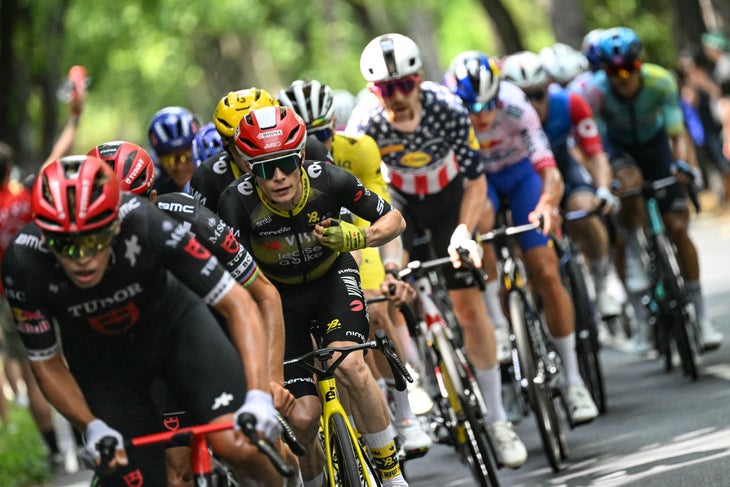
It remains to be seen how things will pan out from here. Friday’s press release from the UCI appeared to threaten possible further consequences, saying that it “shall consider if other measures are warranted in accordance with the UCI Regulations.”
That won’t go down well with the teams concerned who, according to Vaughters, have been feeling frustration for a long time. He insists what happened this week isn’t an isolated incident.
“This is about long-standing tension between the UCI and what I’ll call teams that feel a little bit more strongly about their rights and more strongly about their entrepreneurial possibilities in the world,” he explained.
“In about the last year, there are a certain group of teams that haven’t felt like we’ve been really strongly represented in the legislation of the UCI. That’s unfortunate, and we’ll probably need to try to make some changes there in who and what our representation is.”
So what are some of the points of tension with the UCI?
According to Vaughters, it comes down to what he sees as a lack of respect for riders and teams. He feels the UCI is quick to appropriate blame but not to accept it.
He cites safety as a major concern and gives a specific example—stage 15 of the Tour de France—to support his argument.
“It was the day of the massive crash where Pogačar waited for Vingegaard. There was a massive rock pile in the middle of the road, embedded rocks as sort of decorative feature for the town that we were in,” he explained. “There was a 90 degree corner, we come around it, and it was completely unmarked.
“There was no hay bale, there was no policeman, there was no warning, there was nothing. It was just bam, a bunch of riders into a rock pile.
“We’re very lucky that it didn’t cause a much worse crash. You could kind of tell that the commissaires and the race organization felt bad about it, because they let the second group blatantly motor pace back through the caravan without any sort of consequences.
“They were like, ‘oops, we shouldn’t have done that, we shouldn’t have had the rock pile in the middle of the road.’
“But this is an example of the basics of safety not being addressed. And instead, we’re chasing these other things…
“You have the regulations that came out about handlebars and the regulations that have come out about socks, and the regulations have come out of gear restrictions and the regulations that came out about whatever else …
“The basic feeling, I think, is that while the teams and the athletes obviously want the safest environment for racing possible, that until the core basic things are fixed, the rest of it is a little bit of a facade.”
From Vaughters’ point of view, he sees a lot of what is being proposed for safety as one sided. Measures about handlebar width and gear size are, he feels, implying riders are at fault for crashes, while at the same time he contends that the UCI and organizers are not doing enough to guarantee safe courses.
“I think the responsibility is being totally put on the riders. And I think that’s totally unfair,” he said. “I think it’s really, really, really, fundamentally unfair.
“And if I were president of the AIGCP, I would be losing my mind over the unfairness of these proposed regulations.”
What about rider data rights?
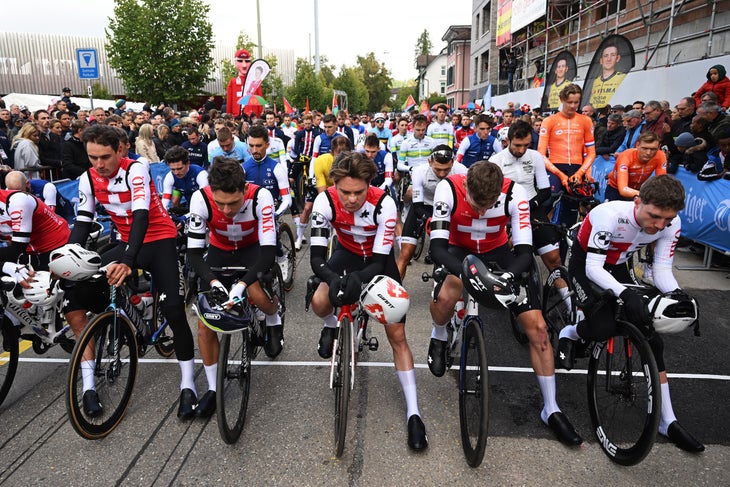
The GPS tracker dispute is, from Vaughters’ point of view, a line in the sand. He sees the introduction of the proposed new UCI system—which, according to the governing body, has been developed with its timing partner “Swiss Timing—as an imposition, in terms of how it has been rolled out.
“It is a lack of respect,” he said.
It’s not that he doesn’t see the argument for GPS trackers. He describes Furrer’s death in last year’s world championships as ‘horrible,’ and said that what happened to her is the reason why the teams didn’t outright refuse to use the UCI’s version of trackers.
His problem is, he insists, with how it was imposed. Specifically, the UCI’s refusal to accept the teams’ request that it pick the riders to use the tracker, and assuming responsibility for the devices.
But what was notable about the UCI’s press release on Friday was a very pointed reference to a venture established over a decade ago by several of the squads in the men’s peloton.
“It should be noted that most of these teams are part of the Velon organization which is the owner of its own data transmission system and is working on the development of its own GPS tracking system,” the UCI said in that statement.
What the governing body didn’t mention is that the Velon system was already successfully trialed in the men’s and women’s Tour de Suisse back in June. Velo understands that ever rider on every team used the devices. Many big names gave a thumbs up afterwards.
So, are rider data rights an element in this dispute?
It’s certainly a factor worth considering.
‘Is the UCI trying to commercialize tracking?’
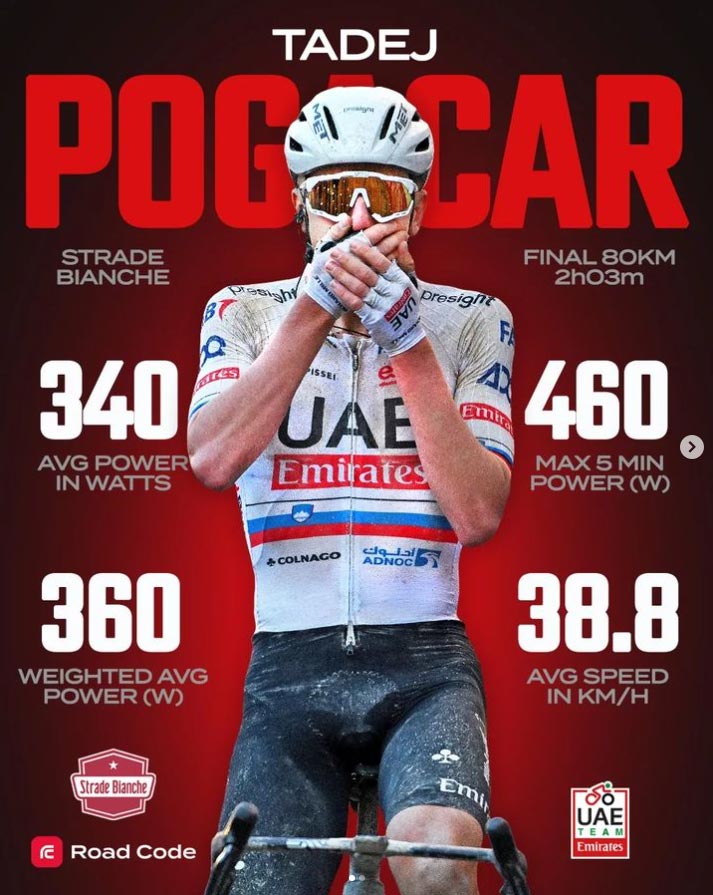
Vaughters’ team is a member of the Velon venture, which was established in 2014 with the aim of helping teams achieve greater stability. It previous ran the Hammer Series of races, which were blocked by the UCI and led to a lawsuit being taken by the teams.
It has also featured live broadcasts of rider data for several years, starting at the 2016 Tour de Suisse.
With the UCI stating on Friday that “broader implementation of this technology is envisaged for coming seasons,” does Vaughters consider that this system could overlap with what Velon does, or the licensing of rider data rights in general?
“Well, I mean it very well could,” he answered. “And then you get into a whole different thing where it’s like, well, is this another one of the entrepreneurial rights of the teams being stripped away? Or the better way to put it, is the UCI trying to commercialize tracking for its own financial benefit?
“I don’t know whether the UCI is trying to commercialize tracking for its own benefit. Obviously, right now the PR shtick is that it’s for safety only. What the long term aims of it are, only they are going to be able to tell you that. I don’t know that.
“But what I do know is that there are very few things that teams have any sort of rights to. Any other professional sport in the world, teams have media rights, revenue, blah, blah, blah, right? Well, in cycling, we don’t. We just don’t have any of that. We’re forced into a business model where you have to sustain yourself on sponsorship. And that is just the way it is.”
Still, he insists that the Romandie dispute was about how the teams were treated there, particularly after previous tensions in the sport.
“Of course it would be great if we could find something that we have just a steady revenue source coming in from,” he said. “But I don’t think that’s the major issue here. I mean, Velon has never made me any money. It’s a nice self-sustaining platform, and it adds to our media platform for the teams.
“But the number of dollars that have come my way from Velon starts with a zero and ends with a zero. So it’s theoretical as to whether or not that that ever would be a possibility.”
Velo reached out to Velon representatives on Friday but hasn’t yet received an official response.
UCI ‘not taking core responsibility for safety’
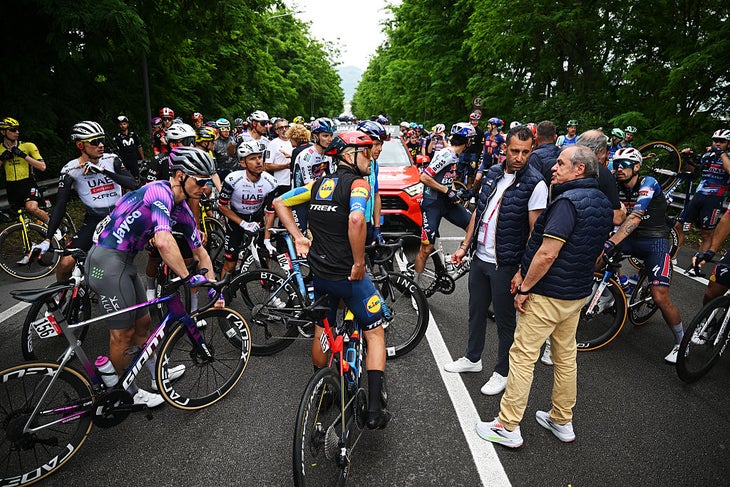
GPS trackers seem destined to have a regular part in races of the future. The deaths of Furrer and others are huge losses and if incorporating such devices enhances rider safety, then they will almost certainly be rolled out across multiple events.
But questions remain for the UCI and also for the teams. Why is the governing body rolling out its own system, and imposing it on the riders? Will it gain commercially from that? Could teams gain commercially if the system is instead done through ventures such as Velon? Are they not entitled to the licensing of their own data, particularly if that increases financial stability in what is an unpredictable environment?
Finally, is there room for a compromise agreement?
From Vaughters’ perspective, he insists there is a bigger issue than ventures such as Velon and the rights to the usage of rider data. He argues the UCI and organizers need to take their own responsibility in relation to race safety rather than passing the buck onto riders and the equipment they use.
“To me, the major part of my decision making on being a part of this group had more to do with just this consistent drum roll of what I would call regulations that are aimed at the teams and the riders, and not really taking the core responsibility for what I believe the bigger problems are in safety. That’s my core reason for taking this moment to stand up.
“This is not a protest. This is not a rebellion,” he said, referring specifically to the tracker standoff this week.
“This is just like, ‘well, it’s your idea. It’s your mandate. We don’t agree with it, but you’re the boss, so put it on the bikes.’ And that was refused.”
